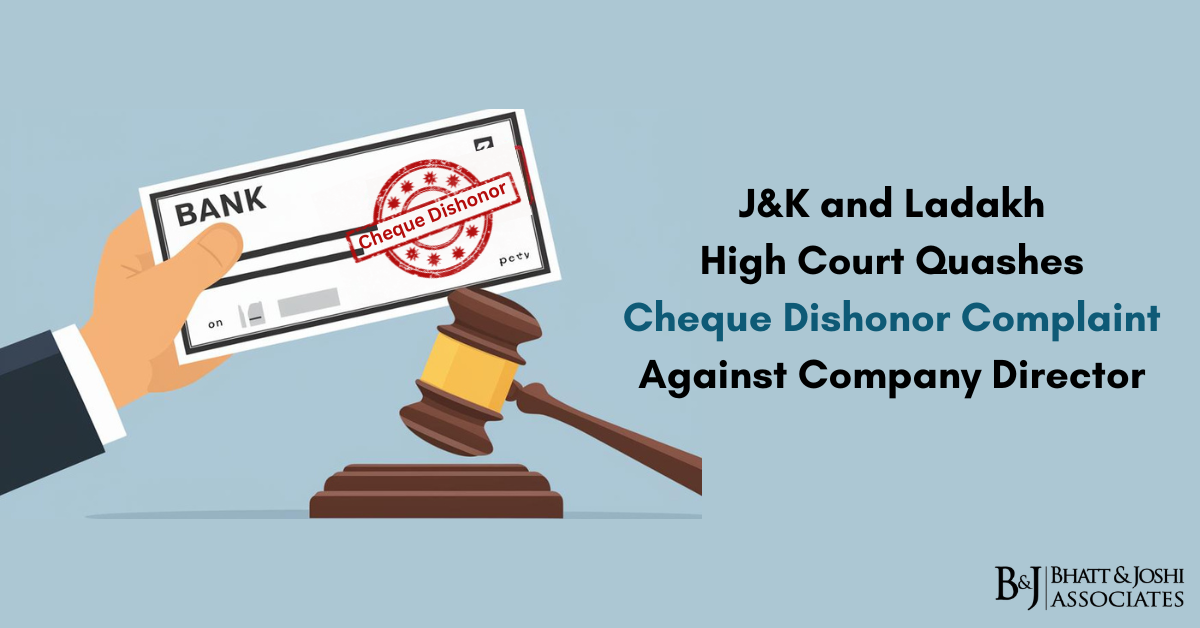Introduction
The Jammu and Kashmir and Ladakh High Court recently quashed a complaint against a company director accused of dishonoring a cheque. The court observed that only the drawer of the cheque can be held liable under Section 138 of the Negotiable Instruments Act (NI Act). This ruling underscores the specific liability provisions for cheque Bounce cases.
Case Background
The case involved Vaibhav Singh, a director of SNP Events and Entertainment Pvt. Ltd., who faced legal proceedings initiated by Taushar Gaind after a cheque issued by another director, Sachin Kumar, bounced. Gaind had loaned Rs. 20.16 lacs to the company and its directors, and the cheque in question, for Rs. 3.66 lacs, was dishonored by the bank.
Court’s Observations
Justice Rajesh Oswal, presiding over the case, emphasized that under Section 138 of the NI Act, Cheque dishonor liability lies with the drawer of the cheque. The court cited the Supreme Court ruling in Alka Khandu Avhad v. Amar Syamprasad Mishra & Anr, stating,
“Section 138 of the NI Act does not speak about the joint liability. Even in case of a joint liability, in case of individual persons, a person other than a person who has drawn the cheque on an account maintained by him, cannot be prosecuted for the offence under Section 138 of the NI Act.”
Legal Arguments
Vaibhav Singh, through his lawyer Ajay Abrol, argued that he had ceased to be a director of the company on March 25, 2021, and that Gaind was aware of this fact. Singh further contended that the cheque was issued from Kumar’s personal account, not the company’s account, thereby absolving him of liability.
Gaind’s lawyer, Rohit Kohli, argued that the loan was provided to the company at the behest of both Singh and Kumar, justifying their inclusion in the complaint.
Court’s Analysis on Cheque Bounce Case
After reviewing the arguments and the evidence, Justice Oswal reiterated the legal position that the offence under Section 138 of the NI Act is committed by the drawer of the cheque. The court noted,
“The offence is committed by the drawer of the cheque. Gaind himself admitted that the cheque was issued from Kumar’s personal account.”
The court referred to the judgments in S.P. Mani and Mohan Dairy vs. Dr. Snehalatha Elangovan and Alka Khandu Avhad vs. Amar Syamprasad Mishra & Anr, highlighting that liability under Section 138 rests with the individual who draws the cheque on their account.
Vicarious Liability Under Section 141
The bench clarified that vicarious liability under Section 141 of the NI Act can be imposed on directors only if they are proven to be responsible for the conduct of the business at the time the offence was committed. The court remarked,
“… this Court is of the considered view that once the cheque has not been issued by the petitioner, but by the respondent No. 3 in the account maintained by him only, the petitioner cannot be prosecuted for the dishonor of the cheque issued by the respondent No. 3.”
Conclusion and Key Takeaways for Cheque Bounce Cases
In light of the observations and the fact that Singh neither signed the cheque nor was it drawn on the company’s account, the court quashed the complaint against him.
Case Title: Sh. Vaibhav Singh vs. Sh. Taushar Gaind














